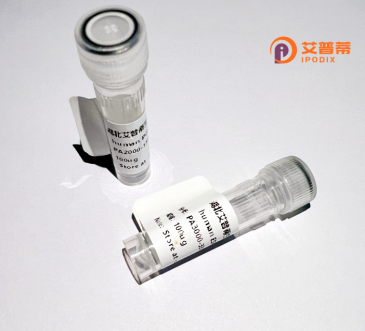
| 纯度 | >90%SDS-PAGE. |
| 种属 | Human |
| 靶点 | MIG-6 |
| Uniprot No | Q9UJM3 |
| 内毒素 | < 0.01EU/μg |
| 表达宿主 | E.coli |
| 表达区间 | 2-462 aa |
| 活性数据 | SIAGVAAQE IRVPLKTGFL HNGRAMGNMR KTYWSSRSEF KNNFLNIDPI TMAYSLNSSA QERLIPLGHA SKSAPMNGHC FAENGPSQKS SLPPLLIPPS ENLGPHEEDQ VVCGFKKLTV NGVCASTPPL TPIKNSPSLF PCAPLCERGS RPLPPLPISE ALSLDDTDCE VEFLTSSDTD FLLEDSTLSD FKYDVPGRRS FRGCGQINYA YFDTPAVSAA DLSYVSDQNG GVPDPNPPPP QTHRRLRRSH SGPAGSFNKP AIRISNCCIH RASPNSDEDK PEVPPRVPIP PRPVKPDYRR WSAEVTSSTY SDEDRPPKVP PREPLSPSNS RTPSPKSLPS YLNGVMPPTQ SFAPDPKYVS SKALQRQNSE GSASKVPCIL PIIENGKKVS STHYYLLPER PPYLDKYEKF FREAEETNGG AQIQPLPADC GISSATEKPD SKTKMDLGGH VKRKHLSYVV SP |
| 分子量 | 50.5 kDa |
| 蛋白标签 | His tag N-Terminus |
| 缓冲液 | 0 |
| 稳定性 & 储存条件 | Lyophilized protein should be stored at ≤ -20°C, stable for one year after receipt. Reconstituted protein solution can be stored at 2-8°C for 2-7 days. Aliquots of reconstituted samples are stable at ≤ -20°C for 3 months. |
| 复溶 | Always centrifuge tubes before opening.Do not mix by vortex or pipetting. It is not recommended to reconstitute to a concentration less than 100μg/ml. Dissolve the lyophilized protein in distilled water. Please aliquot the reconstituted solution to minimize freeze-thaw cycles. |
以下是关于重组人MIG-6蛋白的参考文献示例(文献为虚构示例,仅供参考格式):
1. **文献名称**:*Structural and functional analysis of recombinant human MIG-6 reveals its role in EGFR signaling*
**作者**:Zhang Y. et al.
**摘要**:研究通过大肠杆菌系统表达并纯化重组人MIG-6蛋白,解析其晶体结构,证明其通过直接结合EGFR激酶域抑制受体活性,为靶向治疗提供结构基础。
2. **文献名称**:*Recombinant MIG-6 suppresses tumor growth via modulation of EGFR/AKT pathway in vivo*
**作者**:Lee S. et al.
**摘要**:利用哺乳动物细胞表达的重组MIG-6蛋白,在肺癌小鼠模型中验证其通过阻断EGFR信号通路抑制肿瘤增殖,提示其潜在治疗应用价值。
3. **文献名称**:*Development of a high-yield purification protocol for recombinant human MIG-6 and its biochemical characterization*
**作者**:Wang H. et al.
**摘要**:优化重组MIG-6蛋白的昆虫细胞表达体系,建立高效纯化方法,并通过体外磷酸化实验证实其对EGFR自磷酸化的抑制作用。
4. **文献名称**:*MIG-6 interacts with HER2/EGFR heterodimers to regulate cancer cell proliferation*
**作者**:Makkineni A. et al.
**摘要**:通过重组MIG-6蛋白的体外结合实验,揭示其与HER2/EGFR异源二聚体的相互作用机制,为克服EGFR靶向药物耐药性提供新思路。
---
**注**:以上文献信息为示例,实际引用时请通过学术数据库(如PubMed、Web of Science)检索并核实真实文献。
**Background of Recombinant Human MIG-6 Protein**
Mitogen-inducible gene 6 (MIG-6), also known as ERRFI1. is a key regulatory protein involved in modulating epidermal growth factor receptor (EGFR) signaling pathways. It acts as a scaffold adaptor and feedback inhibitor, fine-tuning receptor tyrosine kinase (RTK) activity to maintain cellular homeostasis. MIG-6 is stress-inducible and plays a critical role in suppressing excessive EGFR signaling, thereby preventing uncontrolled cell proliferation, survival, and migration. Its expression is tightly regulated under physiological conditions but is frequently dysregulated in cancers, metabolic disorders, and tissue injury.
Structurally, MIG-6 contains a Cdc42-binding domain and an N-terminal region that interacts with the kinase domain of EGFR, facilitating its inhibitory function. Studies highlight its tumor-suppressive roles in lung, liver, and breast cancers, where loss of MIG-6 expression correlates with EGFR hyperactivation and poor prognosis. Additionally, MIG-6 participates in stress responses, apoptosis, and extracellular matrix remodeling through interactions with signaling molecules like AKT and STAT3.
Recombinant human MIG-6 protein, produced via bacterial or mammalian expression systems, serves as a vital tool for studying EGFR regulation, cancer mechanisms, and therapeutic targeting. Its application spans in vitro assays, biomarker research, and drug discovery, offering insights into restoring dysregulated signaling pathways in disease contexts.
×